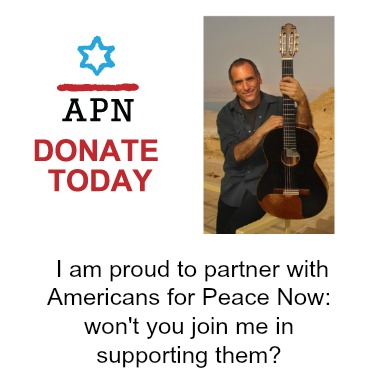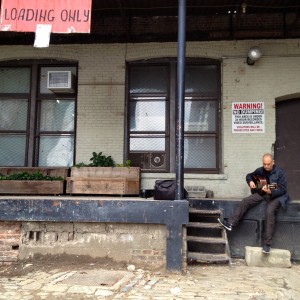David Broza Peace Page
Dear Friend,
Of course, it will be the politicians and diplomats who will negotiate the terms of a peace deal, but with all due respect to the negotiators, an enormous amount of work needs to be done, on the human level, to prepare the ground for a historic compromise, and to solidify the deal, once the ink dries.
 I believe that each and every one has access to tools to promote peace. The tools I
have are my voice, my guitar, and my strumming fingers. They help me speak a language that everyone
understands, the language of music. And through music they help me reach hearts and minds on both sides of
the Israeli-Palestinian divide.
I believe that each and every one has access to tools to promote peace. The tools I
have are my voice, my guitar, and my strumming fingers. They help me speak a language that everyone
understands, the language of music. And through music they help me reach hearts and minds on both sides of
the Israeli-Palestinian divide.
In Israel, veteran musicians like me cannot avoid politics. You are pulled into the political arena without wanting to become a part of politics. It was my first song, Yihiye Tov (It will be Okay), that exposed me to the power of song. It was inspired and written at the occasion of Egyptian President Anwar Sadat’s 1977 visit to Israel, and it became my first hit. Although it spoke about the tragedy of “not seeing the end” to our wars and conflict, it is not a hopeless song. On the contrary, it is filled with faith and love.
I was active in Peace Now, the grassroots peace movement that was established to push then Prime Minister Menachem Begin to sign a peace agreement with Sadat, and which four years later brought 400,000 Israelis to protest against the Lebanon War. Today, people refer to that war as the “first” Lebanon War. Yes, there was a second. Just like we’ve had a first intifada and second intifada, a first Gaza war, and second, and third. I’m losing count.
During that war, in 1982, I was drafted to sing in the front lines. It was my first experience in a war zone, and I became shell-shocked. I was angry and depressed. I performed in anti-war demonstrations. My managers warned me that my political activity was going to destroy my career. That didn’t stop me.
For years, I sought ways to fulfill my dream of not only singing about peace but of actually making peace, on a small scale, through music. Thirty years later, I started working on East Jerusalem West Jerusalem, an album that is a journey, a collaborative experience with Palestinian musicians, focusing on hope and peace. The opening song of this album, “One to Three,” says: “I was born into this reality/ I was brought up with a war/ That doesn’t mean I must accept it/ Don’t want to fight no more.”
On both sides of our divide, most of us — almost all of us, I believe — don’t want to fight any more. We are tired and scarred and fed up with pain and hatred. We seek hope for a better future. This is what my album expresses, hope for a peaceful future between Israelis and Palestinians, a future in which we connect with each other as human beings, above and beyond our national differences.
I tried to both express and practice this notion while creating the album, recording for eight days and eight nights in East Jerusalem, at the studio of the Palestinian band Sabreen, with Palestinian musicians and fellow Israeli musicians.
I love the album, the product of these eight days in the studio, but I equally loved the
journey, working jointly with my Palestinian and Israeli musician friends and the great American singer
songwriter and Grammy Award winner Steve Earle as producer in the intimate settings of the Sabreen
recording studio. I’m so happy that we documented on video the making of the album, as well as the
friendships that I forged with some of my Palestinian musical partners.
The documentary was recently completed and has not yet been distributed. One of my favorite scenes in the DVD is the one documenting the experience of sitting with my friend and musical partner Issa Freij of Sabreen on the roof of his family’s home in the Old City of Jerusalem, making music, laughing, together finding chords on our guitars to accompany the Muslim call for prayer. It’s an experience I will never forget. And it was completely genuine. There was no acting — these people are my friends and partners in peace. I’m blessed to have many peace partners.
As someone who has always been close to Israel’s Peace Now movement, and proud of it, I am today proud to partner with its US sister organization, Americans for Peace Now, to offer you the album and the film — a CD and DVD set — for a donation of $72 or more. All but $15 of your donation is tax-deductible.
As I see it, your gift to APN is a way for you to contribute to bringing Israelis and Palestinians closer to peace. I hope you enjoy the CD and the film documenting the path that led to it, and I hope that both inspire you to continue working for peace.
“Peace gotta come!”
Shana Tova, May this be a year of peace,
David Broza
Born in Israel and raised in England and Spain, Israeli superstar singer-songwriter DAVID BROZA combines folk, flamenco, pop and rock-and-roll, and performs in English, Hebrew and Spanish. He is known for his passion and dedication to humanitarian and political projects, first and foremost the Israeli-Palestinian conflict. A goodwill ambassador for UNICEF, Broza is one of Israel’s most prolific and diverse musicians. East Jerusalem West Jerusalem is his 28th album.

Don't miss this inspiring piece in the New York Times on singer David Broza and his efforts to bring Israelis and Palestinians together through music.
|
Subscribe to APN
Weekly Updates Get connected to our Action Network; receive updates on important issues sent directly to your email address; and receive information about special events going on in your area! |
|
|
Subscribe to our
free, daily news roundup, News Nosh |

|